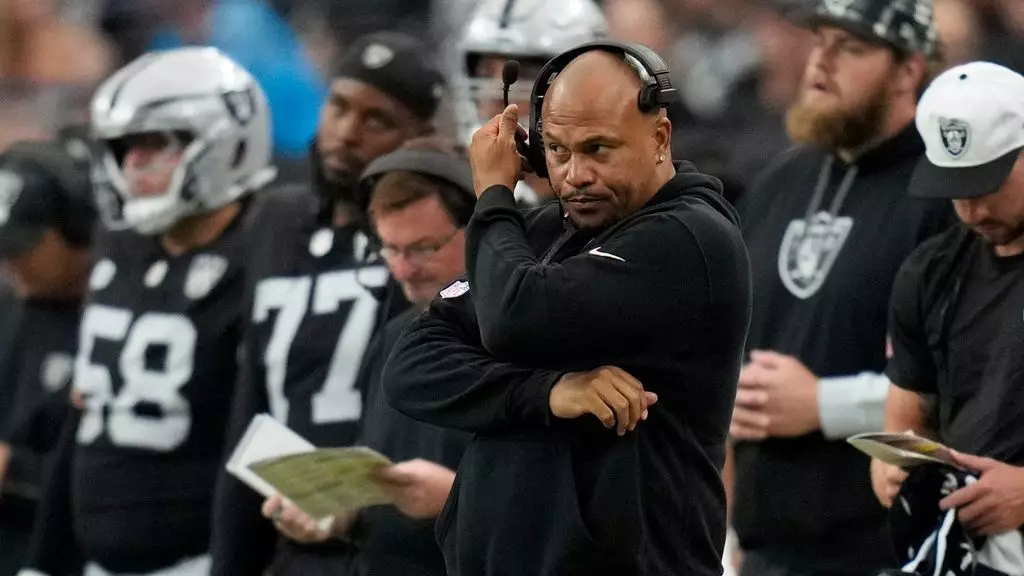The Las Vegas Raiders experienced an unexpected setback during their home opener, suffering a 36-22 loss to the Carolina Panthers. Antonio Pierce, the Raiders’ head coach, was visibly distressed as he addressed the media, struggling to comprehend the team’s lackluster performance. His emotional reaction underscored a broader concern within the franchise: specific players seemed uninvested in the game, prompting Pierce to suggest that “business decisions” were made over the course of the match. This loss marks yet another alarming chapter in the Raiders’ recent history, raising serious questions about the team’s resolve and performance.
The context surrounding the game builds an even deeper narrative. Coming off an emotional comeback victory against the Baltimore Ravens, expectations were high for the Raiders as they faced a Panthers team that had not yet found its footing this season. The Panthers, having benched their former first overall pick, Bryce Young, in favor of seasoned veteran Andy Dalton, presented a seemingly favorable matchup. Yet, the Raiders faltered, an outcome that has left fans and analysts questioning the team’s trajectory. Pierce’s comments reflecting on the game, particularly his assertion that certain players “made business decisions,” imply a deeper issue of commitment and teamwork. It raises critical questions about whether some individuals are prioritizing personal performance over group success.
Maxx Crosby, a defensive standout for the Raiders, echoed the sentiment that accountability is crucial moving forward. Following the debacle against the Panthers, Crosby emphasized the need for reflection among teammates. The statistic that the Raiders allowed 437 total yards underscores a defensive failure that cannot be overlooked; exemplifying a concerning performance against what was perceived as an inferior opponent. Efficiency in both offensive and defensive plays is paramount in the NFL, and the Raiders’ inability to maintain possession—boasting a time disparity of nearly 13 minutes—served as a glaring indicator of their struggles.
What adds to the perplexity of the situation is the apparent disconnect within the team regarding the supposed “business decisions.” Davante Adams, a prominent receiver for the Raiders, seemed caught off guard by Pierce’s assertion, suggesting a lack of clarity or unity among the players. The inconsistency in responses from key players implies that the team may be lacking internal communication, which is vital for any organization aspiring to achieve success in a competitive league.
Further complicating matters was Pierce’s decision to replace starting quarterback Gardner Minshew with rookie Aidan O’Connell late in the game when the outcome appeared bleak. While it could be seen as an opportunity to evaluate the potential of a young quarterback, the timing raised questions. The game’s context and the critical need for momentum could lead one to argue that this was simply a capitulation rather than a strategic decision. Minshew had performed adequately during the game, completing 18 of 28 passes for 214 yards; however, his interception loomed large in the backdrop of the match.
O’Connell’s late-game performance, which saw him leading a modest touchdown drive, may have provided a glimpse of optimism amid the despair. But whether such a fleeting success can be relied upon to shift the fortunes of the team remains to be seen. The inconsistency seen in the quarterback room represents a larger struggle within the Raiders. Opting for O’Connell could mean a transition period for the organization, as they seek to establish a reliable quarterback moving forward.
The path ahead for the Raiders necessitates a thorough reassessment of individual and team dynamics. The loss to the Panthers serves not only as a wake-up call but also as a mirror reflecting the stark reality of the team’s current state. With upcoming games presenting further challenges, it is imperative for the Raiders to rally together, starting with accountability and improved communication.
The Raiders must confront their shortcomings head-on. Addressing issues related to performance not only requires self-reflection among players but also the establishment of a culture predicated on teamwork and mutual respect. As the season progresses, it will be crucial for the Raiders to harness the lessons learned from this devastating loss and emerge stronger, lest they fall further into the cycle of disappointment that has characterized their recent history.

Leave a Reply